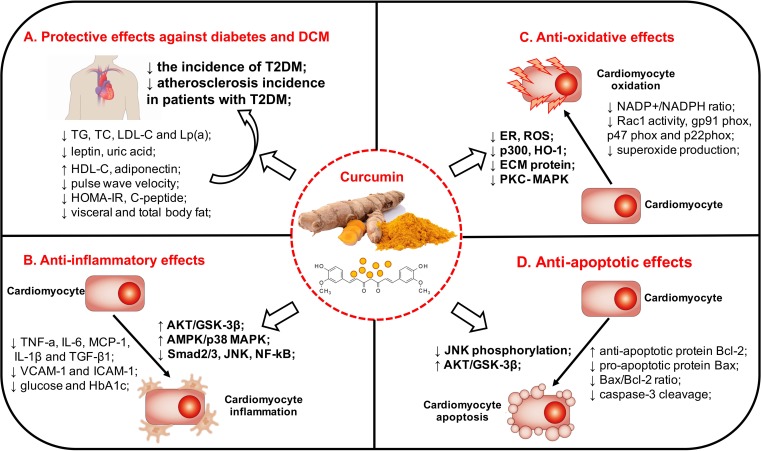FIGURE 2.
The clinical evidence and potential mechanism by which curcumin might mitigate diabetes and DCM. The pathogenesis of diabetes and DCM is multifactorial, and a plethora of molecular mechanisms have been postulated for the onset and development of diabetes and DCM. Clinical trials have shown that curcumin possessed a potency to decrease blood glucose, improve insulin resistance and ameliorate dyslipidemia in patients with diabetes. Curcumin also exerts a variety of positive effects that was able to attenuate inflammatory activation, oxidative stress, and apoptosis in diabetes and DCM through several signaling pathways. DCM, diabetic cardiomyopathy; T2DM, type 2 diabetes mellitus; DCM, diabetic cardiomyopathy; LDL-C, low density lipoprotein cholesterol; Lp(a), lipoprotein(a); HDL-C, high density lipoprotein cholesterol; HOMA-IR, homeostasis model assessment-insulin resistance; IL-1β, interleukin-1β; IL-6, interleukin-6; IL-18, interleukin-18; TNF-α, tumor necrosis factor-α; TGF-β1, transforming growth factor; ICAM-1, intercellular adhesion molecule-1; VCAM-1, vascular cell adhesion molecule-1; HbA1c, glycosylated hemoglobin A1c; AKT, protein kinase B; GSK-3β, glycogen synthase kinase 3β; AMPK, adenosine monophosphate activated protein kinase; MAPK, mitogen-activated protein kinase; Smad, sma- and mad- related protein; JNK, Jun NH2-terminal kinase; NF-κB, nuclear factor kappa-B; TβRII, type II transforming growth factor-β; MCP-1, monocyte chemoattractant protein-1; NADPH, nicotinamide adenine dinucleotide phosphate; Rac1, Ras-related C3 botulinum toxin substrate 1; HO-1, heme-oxygenase-1; ER, endoplasmic reticulum; ROS, reactive oxygen species; ECM, extracellular matrix; PKC, protein kinase C. (A) Curcumin and its protective effects of against diabetes and DCM. (B) Curcumin and its anti-inflammatory effects on diabetes and DCM. (C) Curcumin and its antioxidant properties on diabetes and DCM. (D) Curcumin and its anti-apoptotic effects on diabetes and DCM.

